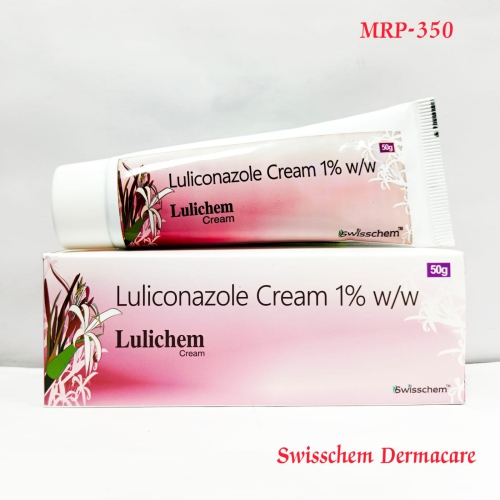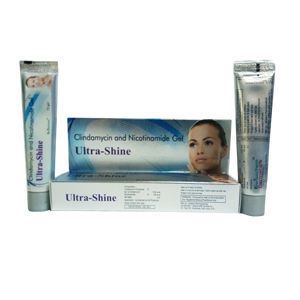Luliconazole 1% Cream 50gm
LULICHEM CREAM
Pack: 50gm With Carton
Luliconazole cream is a prescription antifungal medication used to treat skin infections caused by fungi, including ringworm, athlete’s foot, and jock itch. It belongs to a class of medications called azole antifungals, which work by inhibiting the growth and reproduction of fungi. The cream is applied topically to the affected skin area and is typically used once daily for 1-4 weeks, depending on the severity of the infection and the location of the affected skin. Luliconazole cream is intended for external use only and should not be used in the eyes, mouth, or vagina.
Luliconazole cream is easy to apply and is quickly absorbed into the skin, making it an effective and convenient treatment option for fungal skin infections. The cream should be applied to clean, dry skin and rubbed gently until it is absorbed. It is important to use the cream as directed by your healthcare provider and to continue using it for the full course of treatment, even if symptoms improve before the end of treatment.It is important to speak with your healthcare provider if you have any questions or concerns about using Luliconazole cream. They can provide guidance on the proper use of the medication and monitor your progress to ensure the treatment is effective.
How to use Luliconazole cream:
- Wash and dry the affected area before applying the cream.
- Apply a thin layer of the cream to the affected skin and surrounding area.
- Rub the cream gently into the skin until it is absorbed.
- Wash your hands after applying the cream, unless the hands are the affected area.
- Use the cream once daily, unless directed otherwise by your healthcare provider.
- Continue using the cream for the full course of treatment, even if symptoms improve before the end of treatment.
It is important to use Luliconazole cream as directed by your healthcare provider. If you have any questions or concerns about how to use the cream, speak with your healthcare provider or pharmacist.
Benefits:
Effective treatment: Luliconazole cream is an effective treatment for fungal skin infections such as ringworm, athlete’s foot, and jock itch.
Easy to use: Luliconazole cream is easy to apply and quickly absorbed into the skin, making it a convenient treatment option.
Short treatment duration: The cream is typically used once daily for 1-4 weeks, depending on the severity of the infection and the location of the affected skin.
Side effects:
Skin irritation: The most common side effect of Luliconazole cream is skin irritation, including itching, redness, and stinging at the application site.
Allergic reactions: In rare cases, Luliconazole cream may cause an allergic reaction, including hives, swelling, and difficulty breathing.
Other side effects: Other possible side effects of Luliconazole cream include blistering, peeling, and burning.
Precautions:
Medical history: Inform your healthcare provider of your medical history, including any allergies, liver disease, or kidney disease.
Other medications: Inform your healthcare provider of any other medications you are taking, including over-the-counter medications and supplements.
Application area: Do not apply Luliconazole cream to the eyes, mouth, or vagina.
Allergies: Inform your healthcare provider if you have had an allergic reaction to any antifungal medications in the past.
It is important to speak with your healthcare provider or pharmacist if you have any questions or concerns about using Luliconazole cream. They can provide guidance on the proper use of the medication and monitor your progress to ensure the treatment is effective and safe for you.







